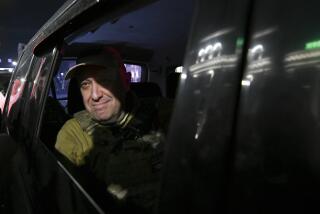Viktor Chebrikov; Former KGB Chief
- Share via
Viktor Chebrikov, 76, the head of the Soviet-era KGB during one of the most infamous incidents in the Cold War, the shooting down of Korean Air Lines Flight 007 in 1983. The KGB ordered the plane downed in Russia’s Far East, leading to the deaths of 269 people, after concluding that it was on a spying mission orchestrated by U.S. intelligence agencies. Afterward, Chebrikov and Soviet Defense Minister Dmitri Ustinov urged the government to keep secret the so-called black boxes from the Korean plane, which were believed to contain information that would have undercut the spying allegation. Chebrikov was born in Ukraine and served in the Red Army during World War II. He was a close friend of Soviet leader Leonid Brezhnev, who appointed him deputy head of the KGB in 1968. Brezhnev’s successor, Yuri Andropov, named Chebrikov head of the agency in 1982. His career went into decline in the late 1980s, and he was ousted from his KGB post and then the ruling Politburo by then-Soviet leader Mikhail S. Gorbachev. Chebrikov never seemed to regret his KGB service. “I’m against a frozen view of the past,” he said last year on Russian television. On Friday in Moscow of heart failure.
Adm. Isaac Kidd; Fleet Commander
Adm. Isaac Campbell Kidd Jr., 79, who served as commander of the U.S. Atlantic Fleet and head of NATO’s Atlantic command before his retirement in 1978. Kidd’s career spanned 40 years, including combat in the Pacific, Atlantic and Mediterranean during World War II and service in the office of the chief of naval operations during the Cuban missile crisis and the Gulf of Tonkin incident. He also presided over the Court of Inquiry investigating the assault on the intelligence-gathering ship Liberty by Israeli forces during the Six-Day War. His career began with his appointment to the Naval Academy in 1938. He was commissioned Dec. 19, 1941, just 12 days after his father, Rear Adm. Isaac C. Kidd, was killed on the battleship Arizona during the attack on Pearl Harbor. The younger Kidd had 23 years of sea duty when he retired, including commands of destroyers, destroyer divisions and squadrons, a flotilla and three U.S. fleets around the world. On June 27 in Alexandria, Va., of cancer.
More to Read
Sign up for Essential California
The most important California stories and recommendations in your inbox every morning.
You may occasionally receive promotional content from the Los Angeles Times.












